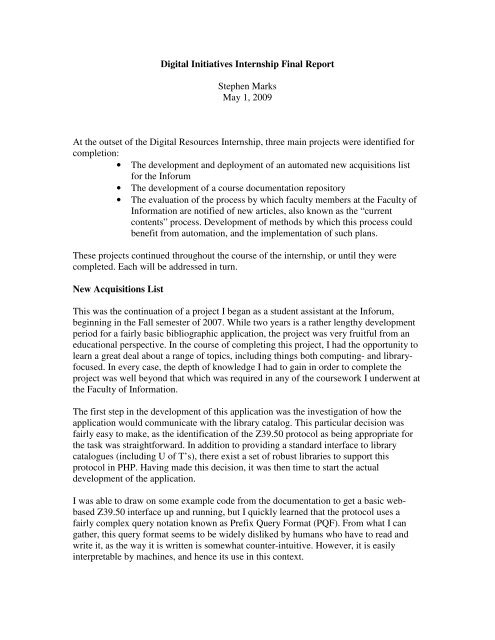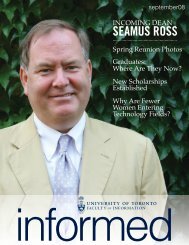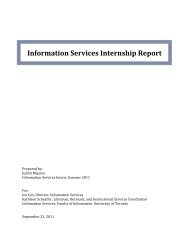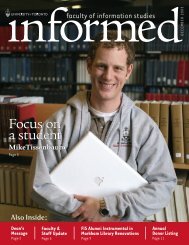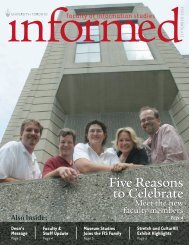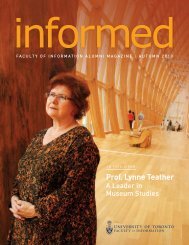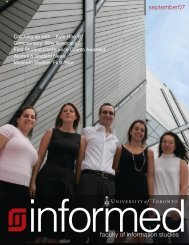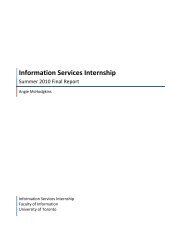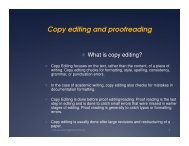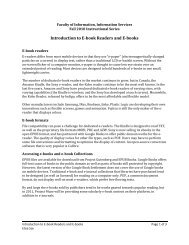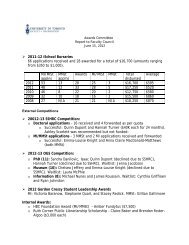Steve Marks, MISt - Faculty of Information - University of Toronto
Steve Marks, MISt - Faculty of Information - University of Toronto
Steve Marks, MISt - Faculty of Information - University of Toronto
You also want an ePaper? Increase the reach of your titles
YUMPU automatically turns print PDFs into web optimized ePapers that Google loves.
Digital Initiatives Internship Final Report<br />
Stephen <strong>Marks</strong><br />
May 1, 2009<br />
At the outset <strong>of</strong> the Digital Resources Internship, three main projects were identified for<br />
completion:<br />
• The development and deployment <strong>of</strong> an automated new acquisitions list<br />
for the Inforum<br />
• The development <strong>of</strong> a course documentation repository<br />
• The evaluation <strong>of</strong> the process by which faculty members at the <strong>Faculty</strong> <strong>of</strong><br />
<strong>Information</strong> are notified <strong>of</strong> new articles, also known as the “current<br />
contents” process. Development <strong>of</strong> methods by which this process could<br />
benefit from automation, and the implementation <strong>of</strong> such plans.<br />
These projects continued throughout the course <strong>of</strong> the internship, or until they were<br />
completed. Each will be addressed in turn.<br />
New Acquisitions List<br />
This was the continuation <strong>of</strong> a project I began as a student assistant at the Inforum,<br />
beginning in the Fall semester <strong>of</strong> 2007. While two years is a rather lengthy development<br />
period for a fairly basic bibliographic application, the project was very fruitful from an<br />
educational perspective. In the course <strong>of</strong> completing this project, I had the opportunity to<br />
learn a great deal about a range <strong>of</strong> topics, including things both computing- and libraryfocused.<br />
In every case, the depth <strong>of</strong> knowledge I had to gain in order to complete the<br />
project was well beyond that which was required in any <strong>of</strong> the coursework I underwent at<br />
the <strong>Faculty</strong> <strong>of</strong> <strong>Information</strong>.<br />
The first step in the development <strong>of</strong> this application was the investigation <strong>of</strong> how the<br />
application would communicate with the library catalog. This particular decision was<br />
fairly easy to make, as the identification <strong>of</strong> the Z39.50 protocol as being appropriate for<br />
the task was straightforward. In addition to providing a standard interface to library<br />
catalogues (including U <strong>of</strong> T’s), there exist a set <strong>of</strong> robust libraries to support this<br />
protocol in PHP. Having made this decision, it was then time to start the actual<br />
development <strong>of</strong> the application.<br />
I was able to draw on some example code from the documentation to get a basic webbased<br />
Z39.50 interface up and running, but I quickly learned that the protocol uses a<br />
fairly complex query notation known as Prefix Query Format (PQF). From what I can<br />
gather, this query format seems to be widely disliked by humans who have to read and<br />
write it, as the way it is written is somewhat counter-intuitive. However, it is easily<br />
interpretable by machines, and hence its use in this context.
Once the application was able to query the library catalogue on a variety <strong>of</strong> fields (and it<br />
should be noted that building in this functionality required me to do significant research<br />
on the MARC record format), a decision needed to be made on how relevant records (i.e.<br />
recent acquisitions by the Inforum) would be identified. For this part <strong>of</strong> the project, I was<br />
able to prevail upon Nadia, Elisa, and Marte for a great deal <strong>of</strong> help. Unfortunately, the<br />
Sirsi catalogue does not expose a usable date through the Z39.50 interface. It was<br />
therefore decided that a local note should be added to the catalogue record <strong>of</strong> relevant<br />
items. This process allows the Inforum not only to have better control over when items<br />
appear in the list, but also to potentially identify items that we do not want to appear in<br />
the catalogue. Finally, a decision was reached on when in the acquisitions workflow the<br />
creation <strong>of</strong> this local note should occur. It was decided that it would most smoothly fit<br />
into the workflow at the time the material is received, at such a time as it passes through<br />
Meera’s desk.<br />
With all these decisions made, the application finally came together. It was placed on a<br />
test web server so that Inforum staff could see how the list developed as new materials<br />
were acquired. As this evaluation process went on, various corrections and refinements<br />
were made to the code, and the application was green-lighted for deployment. Given the<br />
timeframe in which this happened, it was decided that it would be best just to get the<br />
application deployed as a part <strong>of</strong> the new web site, and that is where it lives today, at:<br />
http://www.ischool.utoronto.ca/inforum-technology/collections/new-acquisitions-list<br />
Course Documentation Repository<br />
The second major project undertaken as part <strong>of</strong> this internship was the creation <strong>of</strong> a<br />
course documentation repository. Envisioned as a way for all <strong>Faculty</strong> <strong>of</strong> <strong>Information</strong><br />
stakeholders to have ready access to “first day <strong>of</strong> class”-type <strong>of</strong> information, this<br />
repository would contain such documents as course syllabi, reading lists, course<br />
schedules, and so on. An additional objective <strong>of</strong> the repository was to serve as a central<br />
location for the documentation needed for the re-accreditation <strong>of</strong> the <strong>Faculty</strong> <strong>of</strong><br />
<strong>Information</strong> by the American Libraries Association (ALA). Given that this reaccreditation<br />
process will be beginning in January <strong>of</strong> 2010, this project was extremely<br />
important and time-sensitive.<br />
The first step in the process was the selection <strong>of</strong> a platform to house the materials.<br />
Several platforms were briefly investigated, including eduCommons and Dspace, but in<br />
the end it was decided that the repository would best be integrated with the new and<br />
forthcoming <strong>Faculty</strong> <strong>of</strong> <strong>Information</strong> website. This would necessitate the creation <strong>of</strong><br />
custom code to handle the repository functions, but would allow for the creation <strong>of</strong> a<br />
system that conforms exactly to the <strong>Faculty</strong>’s requirements.<br />
With regard to requirements, their development and codification was the first major step<br />
in this project. The initial requirement meetings consisted <strong>of</strong> Joe, Tasha, James, and<br />
myself. In these meetings, initial requirements were hammered out. These initial<br />
requirements mainly sprang from the needs <strong>of</strong> the ALA auditors, as the audit was the first
and most pressing need for the repository. After these basic needs had been figured out,<br />
they were then expanded to encompass the potential needs <strong>of</strong> other users <strong>of</strong> the course<br />
content repository. This process began in the meetings mentioned above, but was<br />
completed mostly in <strong>of</strong>fline discussions between Tasha, myself, and various members <strong>of</strong><br />
the perceived stakeholder groups. At the end <strong>of</strong> this process, a formal requirements<br />
document was drawn up and submitted to the development team.<br />
At this point, the Web Group took primary responsibility for the development <strong>of</strong> the<br />
repository itself, as their department had the most expertise on the Drupal platform from<br />
their work on the new website. Specifically, James, Danny, and their intern Luke did<br />
pretty much all the work on the repository itself.<br />
In the meantime, the job <strong>of</strong> inventorying the Inforum’s collection <strong>of</strong> material and<br />
digitizing those items we did not have an electronic copy <strong>of</strong> fell to the Inforum side <strong>of</strong> the<br />
project team. Fortunately, Leigh had gone through and organized and inventoried the<br />
paper copies <strong>of</strong> all the historical course documentation, so we were well aware <strong>of</strong> what<br />
we had on that front. Unfortunately, this amounted to approximately 8,000 pages <strong>of</strong> paper<br />
documentation that needed to be converted to digital format. There was also a cache <strong>of</strong><br />
previously acquired electronic documents that needed to be sorted and inventoried.<br />
For the physical documents, the decision was made to outsource the scanning process to a<br />
vendor specializing in this kind <strong>of</strong> job. In retrospect, this was a great decision because the<br />
scanning process would likely still be going on if it was done in-house. I went through<br />
the process <strong>of</strong> evaluating vendors to do the work and settled on Octacom, a document<br />
management company operating out <strong>of</strong> Hamilton. This decision was based on the price to<br />
generate digital copies <strong>of</strong> the documents, and to run them through an optical character<br />
recognition process, so that at some point in the future, they might be fully indexable.<br />
Once this decision had been made, I prepared the documents for scanning by removing<br />
paper clips, staples, etc. and had Octacom come take delivery <strong>of</strong> the documents.<br />
Upon the return <strong>of</strong> the documents, some post-processing was still necessary. Due to the<br />
limitations <strong>of</strong> Octacom’s scanning workflows, and their lack <strong>of</strong> knowledge regarding our<br />
curriculum, each class’s documents were grouped in to one PDF file, regardless <strong>of</strong> how<br />
many years <strong>of</strong> documents there were. These documents obviously had to be split apart in<br />
order to be properly ingested into the repository, and to this end, I was allowed to enlist<br />
the aid <strong>of</strong> the Student Assistants. With the kind the kind assistance <strong>of</strong> Rebecca, Sarah,<br />
and Cintia, we were able to get the PDFs split up into their constituent documents in short<br />
order.<br />
Once the documents had been split, we had a bit <strong>of</strong> a lull, as we waited for the actual<br />
repository to be completed. The decision was made not to do any further inventory <strong>of</strong> the<br />
documents at this point, as we would be able to generate reports automatically once the<br />
repository was completed.<br />
Around the beginning <strong>of</strong> 2009, the course document repository came online, and the<br />
ingest process could begin. This process was primarily carried out by Tasha and myself,
and basically involved associating each document with a specific ‘Section’ node within<br />
the repository, which denoted not only the class number, but also the semester in which it<br />
was <strong>of</strong>fered. Additional metadata was created at this time to describe what requirements<br />
<strong>of</strong> the ALA auditors the document fulfilled, and the general nature <strong>of</strong> its contents.<br />
At the end <strong>of</strong> a week <strong>of</strong> pretty intense data manipulation, all existing course<br />
documentation for the years 2001-2009 was imported into the repository. Reports were<br />
then generated to determine what documents were missing, and instructors are now being<br />
notified that they need to submit this documentation to the Inforum.<br />
Overall, this was a very rewarding project, in the sense that it gave me the opportunity to<br />
work on the design <strong>of</strong> an information system <strong>of</strong> significant scale from start to finish,<br />
beginning with the design requirements and ending with the entering <strong>of</strong> the system into<br />
the maintenance cycle. As a student in the <strong>Information</strong> Systems stream, it was quite<br />
interesting to observe the relevancy <strong>of</strong> much <strong>of</strong> the coursework I had completed,<br />
especially as it regards user requirements and usability issues.<br />
Automation <strong>of</strong> the Current Contents Process<br />
The final, and least successful, <strong>of</strong> the primary projects I was assigned at the beginning <strong>of</strong><br />
the internship was an investigation into the potential for automation in the Inforum’s<br />
Current Contents process. This process is the procedure by which faculty and staff at the<br />
<strong>Faculty</strong> <strong>of</strong> <strong>Information</strong> are notified <strong>of</strong> the publication <strong>of</strong> new articles in their specific<br />
areas <strong>of</strong> interest. They do this by specifying certain journals that they are interested in<br />
monitoring, and they receive photocopies <strong>of</strong> the journals’ tables <strong>of</strong> contents. From these<br />
photocopies they may request articles which are then photocopied and forwarded on to<br />
them through campus mail. Obviously, this is a highly manual process and hence the<br />
desire for some level <strong>of</strong> automation.<br />
Early on in this project, I was contacted by a new pr<strong>of</strong>essor at the <strong>Faculty</strong>, Kelly Lyons,<br />
who was interested in using the reworking <strong>of</strong> this process as a basis for a paper she is<br />
writing on process management in organizations. She inquired as to whether I would be<br />
interested in being involved in this paper and I assented.<br />
With the project being rolled into an academic paper, the requirements suddenly shifted a<br />
bit, as it became more important to capture exactly what improvements the service’s user<br />
base would like to see. To this end, it was decided that interviewing some <strong>of</strong> the<br />
stakeholders would be a prudent move. With this, we embarked on a rather lengthy<br />
process <strong>of</strong> designing an interview form to use in requirements gathering, and on<br />
organizing the administrivia <strong>of</strong> the interviews themselves. Unfortunately, it turns out that<br />
between the time demands <strong>of</strong> a first-year pr<strong>of</strong>essor and a second-year graduate student,<br />
very little time was available to actually do the interviews. As such, they proceeded at a<br />
very slow pace. They did proceed however, and the resulting data has allowed us to get a<br />
general idea <strong>of</strong> what users would like to see from the process.
Now that the interview phase is wrapping up, we are getting ready to embark on the<br />
second part <strong>of</strong> the project, which will involve actually planning the changes to be made to<br />
the process. Although my internship is complete at this point, I have been tasked with<br />
continuing this project in my capacity as System Administrator at the iSchool, and am<br />
still looking forward to seeing how it turns, out.<br />
Other Duties As Assigned<br />
There were a number <strong>of</strong> other duties that I came to be responsible for in my time at<br />
Inforum. One <strong>of</strong> these duties was the teaching <strong>of</strong> a couple <strong>of</strong> workshops on more<br />
technical matters as part <strong>of</strong> the Inforum’s Instructional Series. The two workshops I<br />
taught were Introduction to Podcasting and Introduction to Adobe Photoshop. While I<br />
had some previous documents to work <strong>of</strong>f for the Photoshop course, it was necessary for<br />
me to draw up an all-new curriculum for the podcasting one. This was an interesting<br />
experience for me, as it drew into sharp relief the difficulties in designing instructional<br />
material for a group <strong>of</strong> students who may be at very different levels <strong>of</strong> knowledge. It was<br />
also a learning experience to try and fill the appropriate amount <strong>of</strong> time for a given<br />
workshop. To wit, in one <strong>of</strong> the podcasting workshops, we basically ran out <strong>of</strong> time<br />
because there was so much discussion, while in the other we finished 15 minutes early.<br />
The same material was covered in both workshops. In total, I found the experience<br />
rewarding, as I had never before taught a class in such a structured environment.<br />
Although I can’t say I caught the “teaching bug,” I am definitely happy to have gotten the<br />
chance to teach these workshops.<br />
Another duty that was assigned to me in course <strong>of</strong> this internship was that <strong>of</strong> being the<br />
primary support contact for the Sakai learning management system. Previously, support<br />
has been done by a member <strong>of</strong> the Web Group, but <strong>of</strong> course with the advent <strong>of</strong> the new<br />
website, they had very little time to dedicate to support. I was brought in to do some<br />
initial data entry regarding class sections, and to provide help when things went wrong.<br />
The initial part <strong>of</strong> the project, the data entry, was pitched to me as being a very highintensity<br />
task, and it did create a brief spike <strong>of</strong> work, but in fact the “long tail” <strong>of</strong> support<br />
calls after the term had started proved to require much more effort to deal with.<br />
Having done a great deal <strong>of</strong> technical support in my career, I was comfortable helping<br />
people figure out how to use the system. Of course, there was a significant learning curve<br />
on my part, as there is when you start to pick up any new product, but overall I found the<br />
Sakai system to be quite pleasant to work with. One thing that I feel could have benefited<br />
this duty is the presence <strong>of</strong> a ticket-tracking system for IT issues here at the iSchool. The<br />
hardest part <strong>of</strong> providing support on the LMS was tracking which issues had been acted<br />
upon, and which were still outstanding. In the end, I had to resort to a fancy system <strong>of</strong><br />
email folders to track my progress on trouble tickets, and this slowed down the process<br />
considerably.<br />
Conclusion
Overall, I would characterize the Inforum internship experience as extremely positive.<br />
My initial concern was that the technical nature <strong>of</strong> some <strong>of</strong> the work to be done would<br />
not be as challenging as the work I had done in my previous career as a systems<br />
administrator. However, this concern proved to be completely unfounded, and I was<br />
constantly pushed to learn new things in the technical arena, as well as having to learn a<br />
very great deal about the operation <strong>of</strong> an academic library. Much <strong>of</strong> what I had to learn in<br />
order to do this job was the kind <strong>of</strong> thing that I came to the <strong>University</strong> <strong>of</strong> <strong>Toronto</strong> to learn<br />
in the first place, so this was a very gratifying experience. In fact, I would go so far as to<br />
say that I learned much more about library operations, as well as library-standard<br />
technologies and protocols, than I ever came close to learning in my classes. In this light,<br />
I can only speak in the highest terms <strong>of</strong> my time here at the Inforum.<br />
I very much appreciate the opportunity I was given to be a part <strong>of</strong> the Inforum team, and<br />
the opportunity to make a lasting contribution to the <strong>Faculty</strong> <strong>of</strong> <strong>Information</strong> as the Digital<br />
Initiatives Intern. Throughout the entire process I never felt anything less than completely<br />
supported by the staff and faculty here at the iSchool. I understand that, given the<br />
limitations <strong>of</strong> the coming year’s budget, there will be no possibility <strong>of</strong> internships for the<br />
coming year. Speaking as someone who benefited immensely from this program, I would<br />
like to express my most sincere hope that the program is reinstated sometime in the near<br />
future. I would like to think that we interns made a significant contribution to the quality<br />
<strong>of</strong> service <strong>of</strong>fered at the Inforum, but I know in no uncertain terms that the quality <strong>of</strong><br />
education that I was able to obtain through this program was invaluable.


